|
|
|
Sort Order |
|
|
|
Items / Page
|
|
|
|
|
|
|
| Srl | Item |
| 1 |
ID:
164689
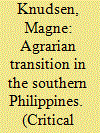

|
|
|
|
|
| Summary/Abstract |
On the southern Philippine island of Mindanao, scholars have documented a precarious land tenure, livelihood, and security situation for many smallholders. Agrarian political economy studies provide insightful analyses of the underlying causes of much poverty and violence on the island. Less attention has been given to cases of smallholder success. This article proposes that conditions for smallholder farming, even among ethnic minority groups, are more varied across the island than the literature suggests. In upland villages of north-central Mindanao, agrarian transition is a multi-directional process that produces different outcomes among households, kin groups, and villages. The main case study is a thriving mixed swidden and fixed field Maranao-Muslim farming village. Almost all the households in the village have successfully claimed land as their own and diversified and improved their livelihoods in recent times. To explain these positive outcomes, the article uses a relational approach and draws on anthropological literature on kinship, land tenure, and place to assess the bargaining power of smallholders in land deals. A stronger cross-fertilization of key insights in agrarian political economy and anthropological literature on kinship enriches the debate on agrarian transition in the southern Philippines.
|
|
|
|
|
|
|
|
|
|
|
|
|
|
|
|
| 2 |
ID:
099880
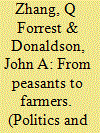

|
|
|
|
|
| Publication |
2010.
|
| Summary/Abstract |
The development of factor markets has opened Chinese agriculture for the penetration of capitalism. This new round of rural transformation-China's agrarian transition- raises the agrarian question in the Chinese context. This study investigates how capitalist forms and relations of production transform agricultural production and the peasantry class in rural China. The authors identify six forms of nonpeasant agricultural production, compare the labor regimes and direct producers' socioeconomic statuses across these forms, and evaluate the role of China's land-rights institution in shaping these forms. The empirical investigation presents three main findings: (1) Peasant differentiation : capitalist forms of agricultural production differentiate peasants into a variety of new class positions. (2) Market-based stratification: producers in capitalist agriculture are primarily stratified by their positions in labor and land markets; their socioeconomic statuses are linked with their varying degrees of proletarianization. (3) Institutional mediation: rural China's dual-track land system plays a crucial role in shaping the diverse and unique forms of capitalist production.
|
|
|
|
|
|
|
|
|
|
|
|
|
|
|
|
| 3 |
ID:
144849
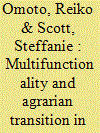

|
|
|
|
|
| Summary/Abstract |
Processes of globalisation in the conventional food provision system have had widespread negative impacts on small-scale farmers. Yet, alternative food networks, which are characterised by more sustainable production/consumption practices and fairer trade relations, have increasingly been ‘going global’ and, in the process, have been integrating small-scale farms in the South. One such high-value export-led commodity is certified organic shrimp. International third-party certification schemes are becoming popular as a tool to verify the intangible attributes of such commodities. Using concepts of multifunctionality and agrarian change, this paper examines the implications of introducing an international environmental certification programme to a site where the ‘peasantry’ has been preserved and has limited integration in the global agro-food system. Drawing on a case study that examines the first certified organic shrimp production project in Vietnam, this paper concludes that the current movement towards post-productivism in the global North has potential to keep local farming practices in the global South by justifying the value of peasant-like production methods through international certification. As a result, the development path of agrarian transition might be reshaped into a form not necessarily pursuing industrialisation. This leads to the new interpretation of pre- and post-productivism beyond the North and South divide.
|
|
|
|
|
|
|
|
|
|
|
|
|
|
|
|
| 4 |
ID:
163226
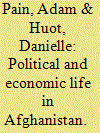

|
|
|
|
|
| Summary/Abstract |
Agriculture has been seen as the engine of growth for Afghanistan, but it has failed to deliver. Evidence from a long-term livelihood study points to a rural economy that is driven more by social relations than by market relations. These are underpinned by major land inequality and a distributional economy concerned with survival, given the absence of rural employment.
|
|
|
|
|
|
|
|
|
|
|
|
|
|
|
|
| 5 |
ID:
142637


|
|
|
|
|
| Summary/Abstract |
Despite its small area and intensively cropped landscape, East Java accounts for 30% of Indonesia's cattle population. About two million households draw on family labour to raise cattle in backyard sheds and small enclosures, largely for cash income. In this paper, we examine the opportunity for such small-scale producers to benefit from Indonesia's economic transformation, given the rising urban demand for beef. The paper reports on a study in two contrasting sites in East Java – irrigated lowlands and rainfed uplands – to explore the constraints facing small-scale cattle producers in these environments, the means by which they have adapted to these constraints (especially by going beyond the farm household to access feed supplies) and possible means to enhance their production systems and incomes. The findings suggest that such cattle production systems can provide a viable source of livelihood, even for resource-poor households; hence, appropriately adapted cattle improvement programmes are a sensible component of a pro-poor development strategy.
|
|
|
|
|
|
|
|
|
|
|
|
|
|
|
|
| 6 |
ID:
109470
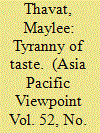

|
|
|
|
|
| Publication |
2011.
|
| Summary/Abstract |
Fair-trade and organic products are often sold at price premiums justified by smaller production volumes that are associated with greater social and environmental responsibility. The consumption of these products confers on the consumer a greater sense of morality - and usually a claim to better taste. This paper tells the story of attempts to promote organic/fair-trade rice production by de facto organic Cambodian farmers for export to North American and European markets in order to assist poor farmers to trade their way out of poverty. It demonstrates that instead of promoting sustainable agriculture and fair trade between developed and developing markets, organic/fair-trade projects may impose First World consumer ideals and tastes that are out of step with the larger realities of agrarian transition in Cambodia and the wider region of developing Southeast Asia.
|
|
|
|
|
|
|
|
|
|
|
|
|
|
|
|
|
|
|
|
|